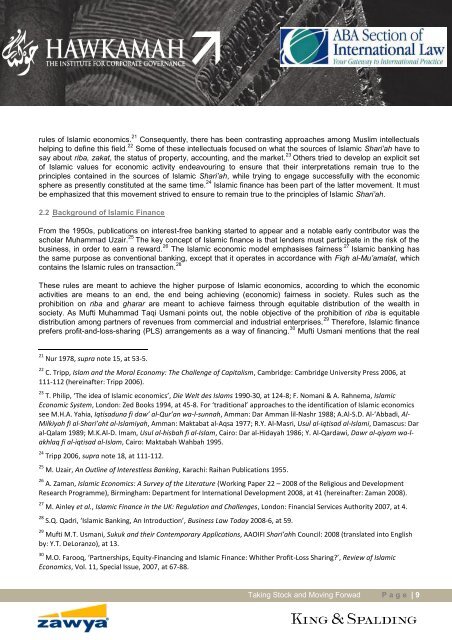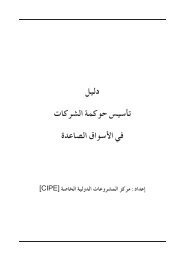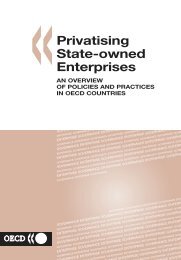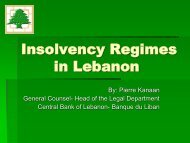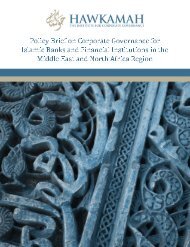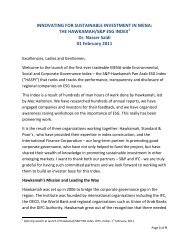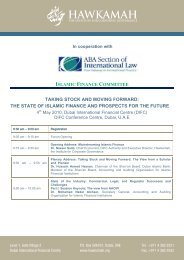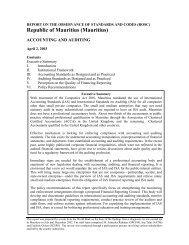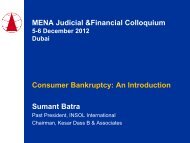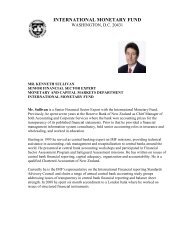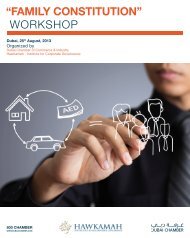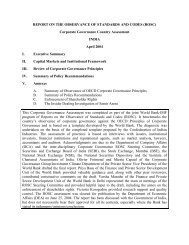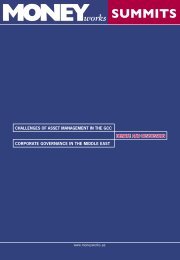THE STATE OF ISLAMIC FINANCE AND PROSPECTS FOR THE ...
THE STATE OF ISLAMIC FINANCE AND PROSPECTS FOR THE ...
THE STATE OF ISLAMIC FINANCE AND PROSPECTS FOR THE ...
- No tags were found...
You also want an ePaper? Increase the reach of your titles
YUMPU automatically turns print PDFs into web optimized ePapers that Google loves.
ules of Islamic economics. 21 Consequently, there has been contrasting approaches among Muslim intellectualshelping to define this field. 22 Some of these intellectuals focused on what the sources of Islamic Shari’ah have tosay about riba, zakat, the status of property, accounting, and the market. 23 Others tried to develop an explicit setof Islamic values for economic activity endeavouring to ensure that their interpretations remain true to theprinciples contained in the sources of Islamic Shari’ah, while trying to engage successfully with the economicsphere as presently constituted at the same time. 24 Islamic finance has been part of the latter movement. It mustbe emphasized that this movement strived to ensure to remain true to the principles of Islamic Shari’ah.2.2 Background of Islamic FinanceFrom the 1950s, publications on interest-free banking started to appear and a notable early contributor was thescholar Muhammad Uzair. 25 The key concept of Islamic finance is that lenders must participate in the risk of thebusiness, in order to earn a reward. 26 The Islamic economic model emphasises fairness .27 Islamic banking hasthe same purpose as conventional banking, except that it operates in accordance with Fiqh al-Mu’amalat, whichcontains the Islamic rules on transaction. 28These rules are meant to achieve the higher purpose of Islamic economics, according to which the economicactivities are means to an end, the end being achieving (economic) fairness in society. Rules such as theprohibition on riba and gharar are meant to achieve fairness through equitable distribution of the wealth insociety. As Mufti Muhammad Taqi Usmani points out, the noble objective of the prohibition of riba is equitabledistribution among partners of revenues from commercial and industrial enterprises. 29 Therefore, Islamic financeprefers profit-and-loss-sharing (PLS) arrangements as a way of financing. 30 Mufti Usmani mentions that the real21 Nur 1978, supra note 15, at 53-5.22 C. Tripp, Islam and the Moral Economy: The Challenge of Capitalism, Cambridge: Cambridge University Press 2006, at111-112 (hereinafter: Tripp 2006).23 T. Philip, ‘The idea of Islamic economics’, Die Welt des Islams 1990-30, at 124-8; F. Nomani & A. Rahnema, IslamicEconomic System, London: Zed Books 1994, at 45-8. For ‘traditional’ approaches to the identification of Islamic economicssee M.H.A. Yahia, Iqtisaduna fi daw’ al-Qur’an wa-l-sunnah, Amman: Dar Amman lil-Nashr 1988; A.Al-S.D. Al-‘Abbadi, Al-Milkiyah fi al-Shari’aht al-Islamiyah, Amman: Maktabat al-Aqsa 1977; R.Y. Al-Masri, Usul al-iqtisad al-Islami, Damascus: Daral-Qalam 1989; M.K.Al-D. Imam, Usul al-hisbah fi al-Islam, Cairo: Dar al-Hidayah 1986; Y. Al-Qardawi, Dawr al-qiyam wa-lakhlaqfi al-iqtisad al-Islam, Cairo: Maktabah Wahbah 1995.24 Tripp 2006, supra note 18, at 111-112.25 M. Uzair, An Outline of Interestless Banking, Karachi: Raihan Publications 1955.26 A. Zaman, Islamic Economics: A Survey of the Literature (Working Paper 22 – 2008 of the Religious and DevelopmentResearch Programme), Birmingham: Department for International Development 2008, at 41 (hereinafter: Zaman 2008).27 M. Ainley et al., Islamic Finance in the UK: Regulation and Challenges, London: Financial Services Authority 2007, at 4.28 S.Q. Qadri, ‘Islamic Banking, An Introduction’, Business Law Today 2008-6, at 59.29 Mufti M.T. Usmani, Sukuk and their Contemporary Applications, AAOIFI Shari’ahh Council: 2008 (translated into Englishby: Y.T. DeLoranzo), at 13.30 M.O. Farooq, ‘Partnerships, Equity-Financing and Islamic Finance: Whither Profit-Loss Sharing?’, Review of IslamicEconomics, Vol. 11, Special Issue, 2007, at 67-88.Taking Stock and Moving Forwad P a g e | 9


